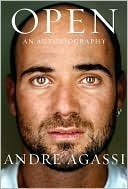More on this book
Community
Kindle Notes & Highlights
Soon the pain felt wonderful, almost sweet, because it was the kind that you can tell precedes relief. But maybe all pain is like that.
It’s no accident, I think, that tennis uses the language of life. Advantage, service, fault, break, love, the basic elements of tennis are those of everyday existence, because every match is a life in miniature. Even the structure of tennis, the way the pieces fit inside one another like Russian nesting dolls, mimics the structure of our days. Points become games become sets become tournaments, and it’s all so tightly connected that any point can become the turning point. It reminds me of the way seconds become minutes become hours, and any hour can be our finest. Or darkest. It’s our choice.
What you feel doesn’t matter in the end; it’s what you do that makes you brave.
If I take the money, there’s no turning back. I’m pro. So? If I cash this check, Pops, that’s it. He acts as if we have a bad connection. You’ve dropped out of school! You have an eighth-grade education. What are your choices? What the hell else are you going to do? Be a doctor? None of this comes as news, but I hate the way he puts it.
Against great players I rise to the challenge. Against bad players I press, which is the tennis term for not letting things flow. Pressing is one of the deadliest things you can do in tennis.
But dreams, I tell Gil, in one of our quiet moments, are so damned tiring. He laughs. I can’t promise you that you won’t be tired, he says. But please know this. There’s a lot of good waiting for you on the other side of tired. Get yourself tired, Andre. That’s where you’re going to know yourself. On the other side of tired.
A win doesn’t feel as good as a loss feels bad, and the good feeling doesn’t last as long as the bad. Not even close.
In tennis, like cards, twenty-one’s a winner. Blackjack! Focus on that number, and you won’t go wrong. Simplify, simplify. Every time you win a set, say to yourself, That’s one down. That’s one in my pocket. At the start of a tournament, count backward from twenty-one. That’s positive thinking, see? Of course, speaking for myself, when I’m playing blackjack, I’d rather win with sixteen, because that’s winning ugly. No need to win with twenty-one. No need to be perfect.
Above all, Martin has a tic. A tell. Some players, when serving, look at their opponent. Some look at nothing. Martin looks at a particular spot in the service box. If he stares a long time at that spot, he’s serving in the opposite direction. If he merely glances, he’s serving right at that spot. You might not notice it at o-o, or 15-love, but on break point, he stares at that spot with psycho eyes, like the killer in a horror movie, or glances and looks away like a beginner at the poker tables.
This is the only perfection there is, the perfection of helping others. This is the only thing we can do that has any lasting value or meaning. This is why we’re here. To make each other feel safe.
In the semis I meet Leander Paes, from India. He’s a flying jumping bean, a bundle of hyperkinetic energy, with the tour’s quickest hands. Still, he’s never learned to hit a tennis ball. He hits off-speed, hacks, chips, lobs—he’s the Brad of Bombay. Then, behind all his junk, he flies to the net and covers so well that it all seems to work. After an hour you feel as if he hasn’t hit one ball cleanly—and yet he’s beating you soundly. Because I’m prepared, I stay patient, stay calm, and beat Paes 7-6, 6-3.
Even when we vow to change, even when we sorrow and atone for our mistakes, the momentum of our past keeps carrying us down the wrong road. Momentum rules the world. Momentum says: Hold on, not so fast, I’m still running things here.
After dinner Mandela stands and gives a stirring talk. His theme: we must all care for one another—this is our task in life. But also we must care for ourselves, which means we must be careful in our decisions, careful in our relationships, careful in our statements. We must manage our lives carefully, in order to avoid becoming victims.
I play and keep playing because I choose to play. Even if it’s not your ideal life, you can always choose it. No matter what your life is, choosing it changes everything.
But I have children. I used to sleep until eleven thirty in the morning on the day of a match. Now I can’t sleep later than seven thirty. Stefanie keeps the children quiet, but something in my body knows they’re up, they want to see their father. More, their father wants to see them.
The essence of good discipline is respect. Respect for authority and respect for others. Respect for self and respect for rules. It is an attitude that begins at home, Is reinforced at school, And is applied throughout life.
Life is a tennis match between polar opposites. Winning and losing, love and hate, open and closed. It helps to recognize that painful fact early. Then recognize the polar opposites within yourself, and if you can’t embrace them, or reconcile them, at least accept them and move on. The only thing you cannot do is ignore them.
More, I hope it will be one of many books that give them comfort, guidance, pleasure. I was late in discovering the magic of books. Of all my many mistakes that I want my children to avoid, I put that one near the top of the list.


